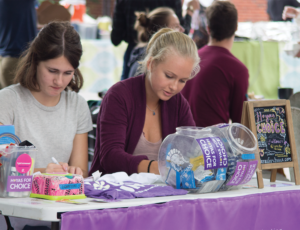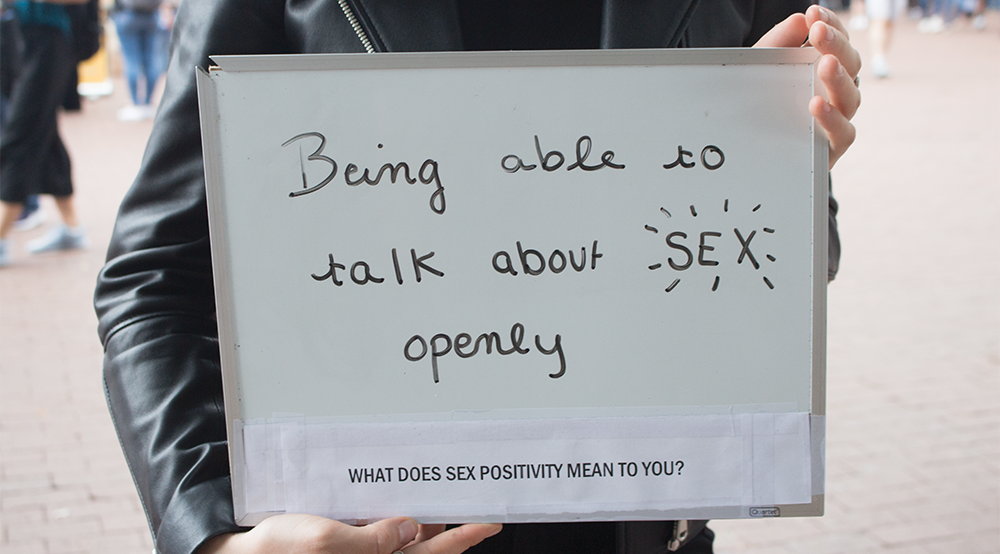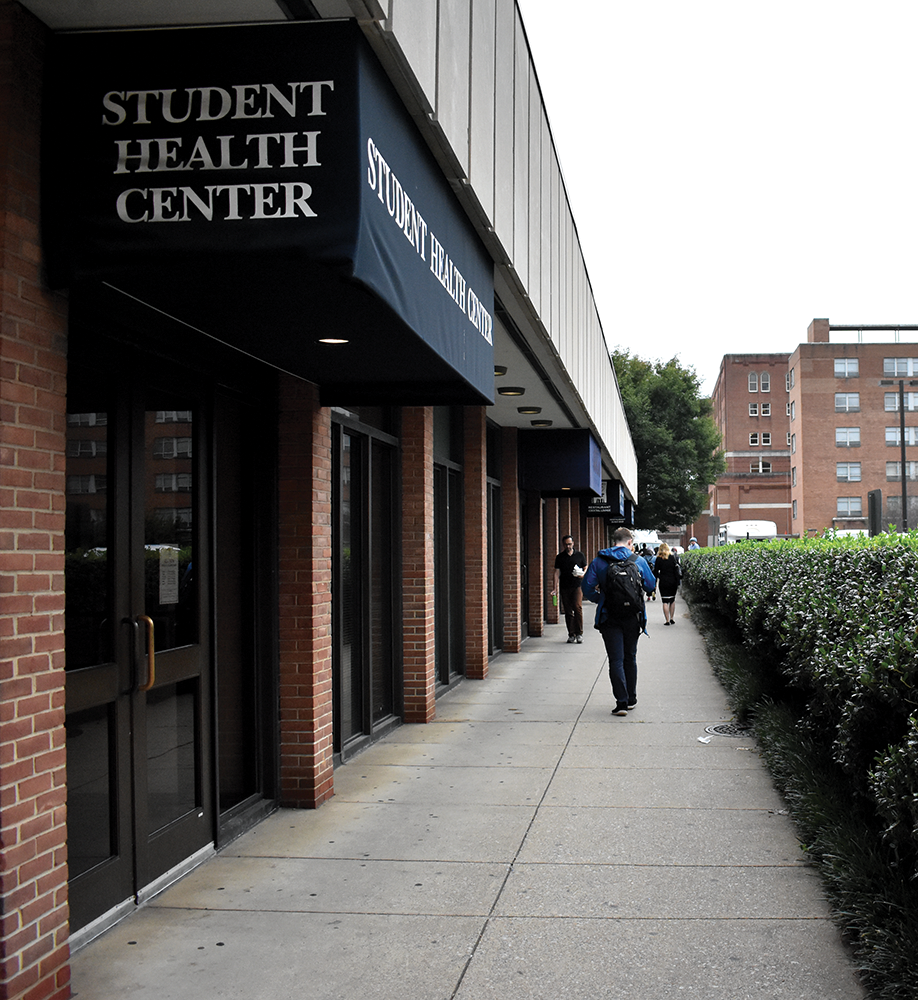
When professor Derek Goldman was directing “In The Next Room, or the vibrator play” last spring, he was acutely aware that, to some on campus, the production would appear salacious at first blush. The play deals frankly with female sexuality, exploring how the invention of the vibrator permitted women to experience sexual satisfaction in the otherwise stifling Victorian era.
But Goldman, who serves as the founding director of The Laboratory for Global Performance and Politics, said the nudity and adult content of the play, far from being gratuitous, did not preclude it from rendering the human experience in an honest, sophisticated way.
According to Goldman, such productions are integral to conversations about sex on campus, particularly at a Catholic university as devoted to care of the whole person as Georgetown.
“There is an understanding about human sexuality, that it’s such a central part of students’ lives and development, and that it is important for the campus to provide spaces for the expression of it and exploration of it, which is of course what theater does,” Goldman said. “But I am not naive. I know there are areas of campus where there are still battles to be waged and silencing that happens and prejudice that happens.”
Working With Restrictions
According to university spokeswoman Rachel Pugh, the university’s official stance gives faculty the latitude to discuss sex and sexuality freely, but imposes some restrictions on those acting on behalf of the university on matters where sexual expression and traditional Catholic doctrine clash.
“Faculty and students are free to speak out on all issues and topics of interest to them,” Pugh wrote in a statement to The Hoya. “The university’s position on contraception and abortion are in alignment with Catholic views on these issues, and those acting on behalf of the institution are required to uphold the university’s guidelines on these topics.”
In some cases, these restrictions manifest themselves in rules governing acceptable speech by university employees. Residential hall office managers and residential assistants, for instance, are prohibited from displaying materials on their doors or openly advocating for contraception while acting in their roles.
Women’s and gender studies program Director You-Me Park said that although she feels faculty members in her department are not directly constrained in their ability to discuss issues relating to sex and sexuality, the university’s institutional restrictions on contraception deal a blow to free speech on campus.
“When it comes to free speech, I will have to say we have a lot of issues to tackle,” Park said. “The university needs to recognize pro-choice groups on campus. We should be able to offer young women on this campus much better support and service in terms of their sexual health. These are issues that bigger than just our department and need to be addressed at an institutional level.”
Another restriction involves selectively withholding university recognition from groups that do not comply with Catholic doctrine.
Without university recognition, groups cannot reserve spaces for meetings and events in areas such as the Copley Formal Lounge or the Healey Family Student Center Social Room without partnerships with recognized student groups. These organizations are further reliant on their own fundraising for speakers and events, as they are excluded from the Student Activities Commission budget.

For most of H*yas for Choice’s 26-year history, the pro-abortion rights group has operated on the margins as an organization unrecognized by the university, acting as the only provider of contraception on campus. Though the organization is limited to tabling in selected zones in Red Square, the Leavey Center and the HFSC, H*yas for Choice Co-President Michaela Lewis (COL ’18) said the lack of recognition actually provides the organization with a degree of freedom to act in ways the university does not, as with its condom distribution system.
“The big question we’re always asked is how do we feel that H*yas for Choice has to operate in sneaky ways to get around policies, where we table only in certain spaces, and raise our own funds, and kind of build ourselves from the bottom-up because we have no institutional support,” Lewis said. “And frankly H*yas for Choice does very well with navigating that policy and having a presence on campus.”
Nevertheless, H*yas For Choice Co-President Annie Mason (COL ’18) said the university’s institutional barriers still provide challenges for the organization’s existence. For one, operating on the margin creates a situation where the organization relies on the interests of students passionate about reproductive justice, as no institutional support exists to keep H*yas For Choice afloat.
Mason said the university’s approach to speaker events concerning sexual behavior also tended to be overly regimented.
When the Lecture Fund hosted Planned Parenthood President Cecile Richards in April 2016, the university dictated that seats be allotted to both H*yas For Choice and anti-abortion rights group GU Right to Life and that both organizations be given equal time at the microphone during the subsequent question-and-answer session.
“It was really great that we were able to host that event, and in a lot of ways, in a lot of people’s minds, at a Catholic university, it was something that would not even be possible,” Mason said. “But also, the way that the event occurred, you’d never have in a discussion about climate change on campus the requirement that half the audience is reserved for people who don’t believe in climate change, and that half the Q&A is reserved for people who don’t believe in climate change.”
Amelia Irvine (COL ’19), former president of anti-abortion group GU Right to Life and current president of Love Saxa, an organization dedicated to promoting chastity and marriage between a man and a woman, said Georgetown’s Catholic values should inform the university’s free speech policies.
“It’s within Georgetown’s rights to promote a Catholic understanding of human sexuality and the human person; some might even say that it’s Georgetown’s duty to do so,” Irvine wrote in an email to The Hoya. “It would be a colossal betrayal of Catholic values to recognize H*yas for Choice as a student group.”
While Irvine believes that the administration has given both Love Saxa and GU Right to Life a space to freely express their ideas, she said both organizations encounter hostility from members of the student body who do not think the groups should be allowed to express their ideas. She cites the vandalism of a GU RTL chalk display which occurred last October, as well as a more recent attempt to scribble out chalk this year.
“I’d like to add that HFC may encounter administrative roadblocks, but their speech is welcomed by the Georgetown community, while GU RTL’s is not,” Irvine wrote. “There doesn’t seem to be a stigma associated with being a member of HFC, but new students are sometimes intimidated to table for RTL because they don’t want to publicly ‘come out’ as being pro-life.”
Debate Over Free Speech
GU Pride President Chad Gasman (COL ’20) characterizes free speech as a double-edged sword — one that permits students belonging to the lesbian, gay, bisexual, transgender and queer communities to express themselves and celebrate their identities, while also leaving them vulnerable to threats of violence and intimidation.
Their own organization — GU Pride — has a storied history of university recognition, beginning with a nine-year legal battle to get GU Pride’s precursor, an organization called Gay People of Georgetown, recognized and culminating in a 1989 ruling by the D.C. Court of Appeals dictating that Catholic universities must recognize queer groups. GU Pride has existed in some form with university recognition ever since.
Gasman said the university should not cling to a definition of free speech that includes organizations such as Love Saxa, which they categorize as a hate group that sponsors a homophobic agenda in its exclusion of same-sex couples from its definition of marriage.
“Groups like Love Saxa, which I would characterize as a hate group, are allowed to put on events just like GU Pride does,” Gasman said. “In the student code of conduct it says very clearly that recognized groups must not foster an unwelcome or hateful environment, and the university should do its job in upholding these standards for groups like Love Saxa, which regardless of how on the surface they are nice to people like I am, their underlying mission statement is unwelcome and hateful.”
Irvine dismisses allegations that Love Saxa is a hate group as ridiculous, stressing that her organization upholds the same definition of marriage as the Catholic Church.
“I recognize that it is easier to point fingers and cry ‘hate group!’ instead of substantively thinking about issues and discussing pros and cons,” Irvine wrote. “This strategy is counterproductive and detrimental to free speech and expression on campus. The Catholic Church holds to the same definition of marriage as Love Saxa, and conforms to RTL’s beliefs on life issues. Should we banish the Catholic Chaplaincy for these reasons? That would be absurd.”
But Gasman said that the expression of queer identity on campus is compatible with Georgetown’s religious tradition.
“Catholics believe in things like justice and diversity and caring for the whole person, and I don’t think it goes against Catholic doctrine to be openly queer. I don’t think it goes against Catholic doctrine to support queer people on a campus like this,” Gasman said. “I’m not personally Catholic, but I am religious, and while some people espouse a religion that is homophobic, I think you can very much be faithful and be queer at the same time.”





















Scotus • Oct 14, 2017 at 2:22 pm
“Catholics believe in things like justice and diversity and caring for the whole person, and I don’t think it goes against Catholic doctrine to be openly queer. I”
Gasman is simply incorrect. The Catechism states that “[Homosexual acts] are contrary to the natural law. They close the sexual act to the gift of life. They do not proceed from a genuine affective and sexual complementarity. Under no circumstances can they be approved.”
Of course, it proceeds to remind us that “[queer people] must be accepted with respect, compassion, and sensitivity. Every sign of unjust discrimination in their regard should be avoided. These persons are called to fulfill God’s will in their lives and, if they are Christians, to unite to the sacrifice of the Lord’s Cross the difficulties they may encounter from their condition.” But this does not mean blatant acceptance and promotion of sin, but rather support for the innate goodness and holiness of every child of God, and the affirmation that “Homosexual persons are called to chastity.”
The University does a disservice to all queer people by rejecting the Church’s teaching on human sexuality.